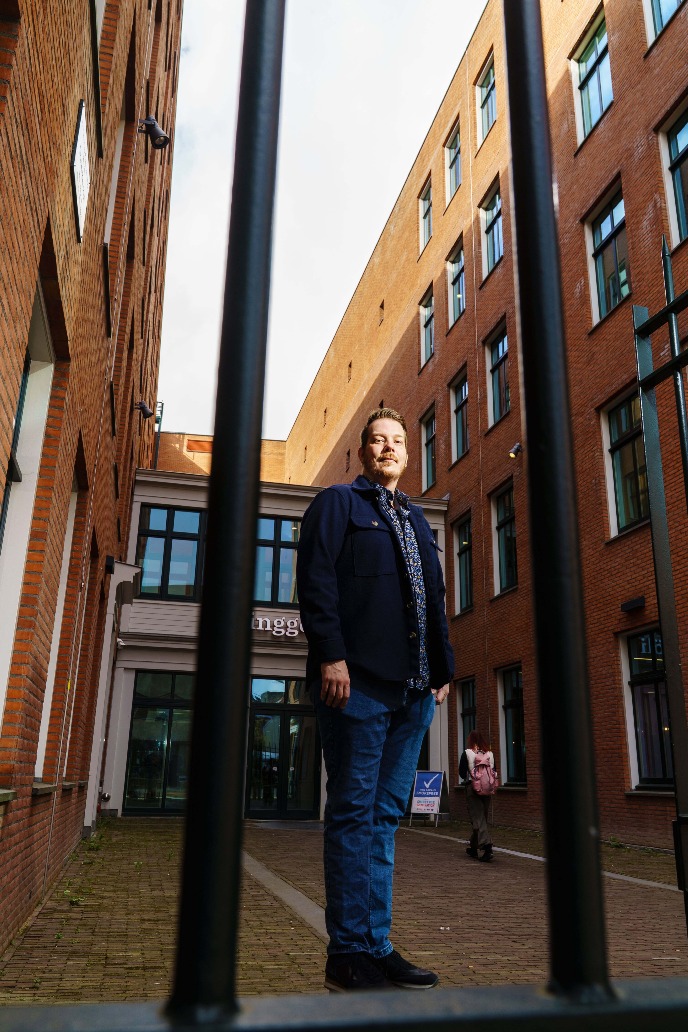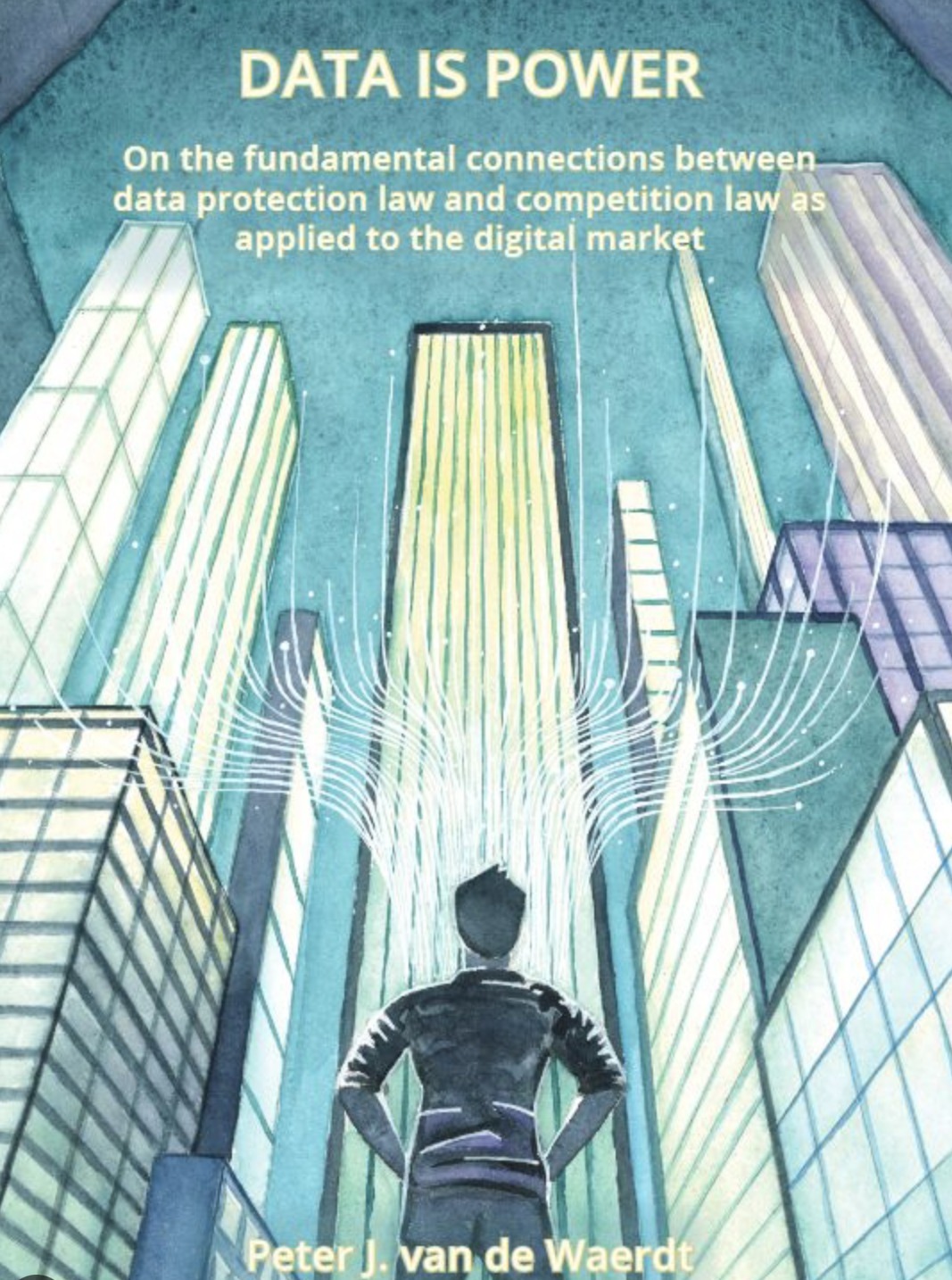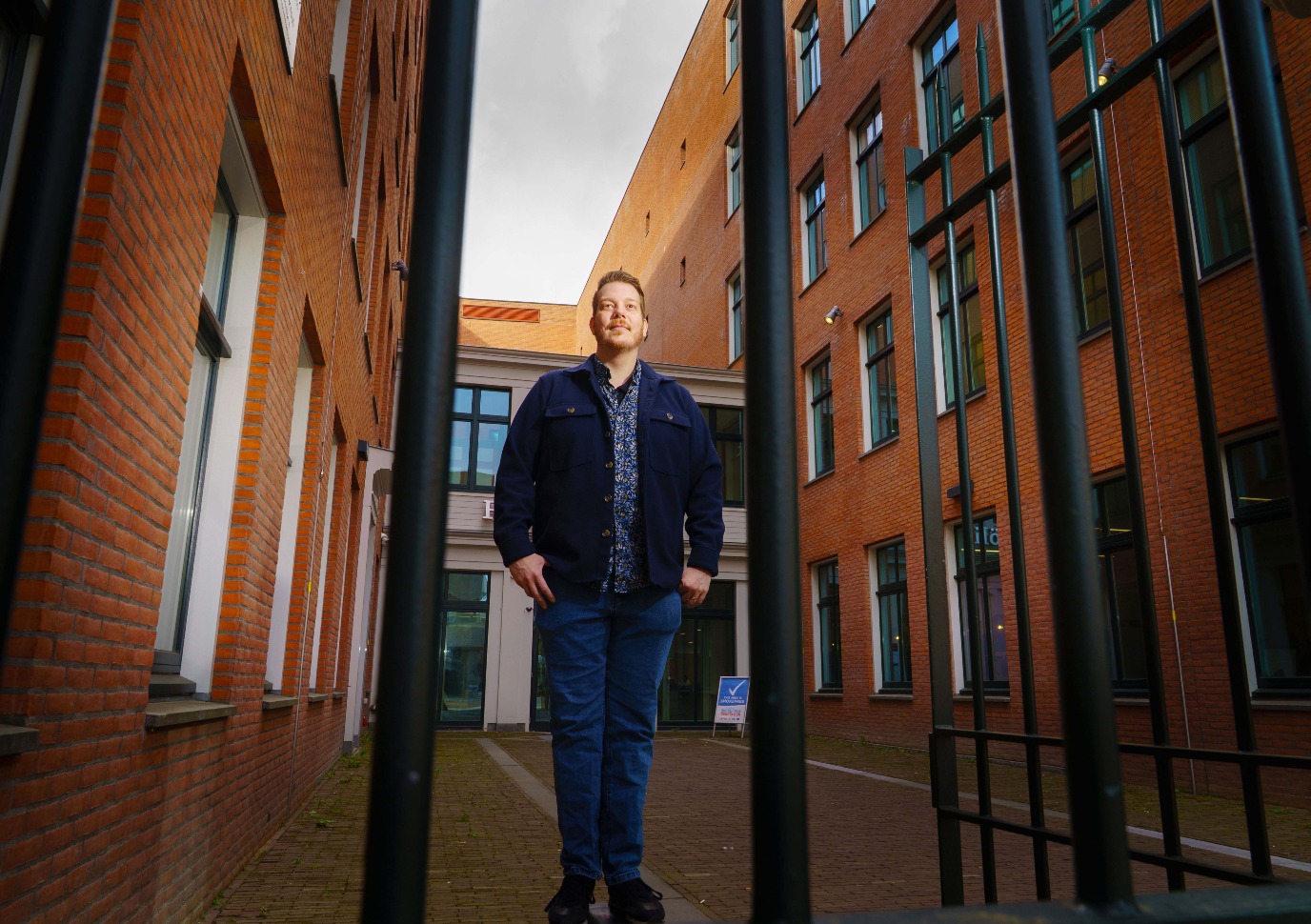How do you shield yourself from Big Tech's power?

How can we all become less dependent on Big Tech? A topical and urgent question that is also arising within the University. Recently, a petition by a group of staff members made the rounds that called for the University to break away from Google and Amazon. Peter van de Waerdt obtained his PhD in November last year on this very subject. The significant title of his thesis: Data is power.
Text: Merel Weijer, Corporate Communicatie / Photos: Reyer Boxem
Initially, he was not particularly passionate about privacy and competition law. Like many students who start their Law degree, he wanted to become a criminal defence lawyer. Pretty soon, however, he shifted his focus and specialized in European human rights and privacy law during his Master’s. Now, many years later and holding a PhD in data protection law and competition law, Van de Waerdt is proud of his PhD thesis, which has a beautiful cover page created by a Groningen artist. His parents already predicted it and so it happened: from the moment he arrived here from Nijkerk to study law, he fell in love with Groningen and he has not left since.

Big Tech and politics
Van de Waerdt was inspired by the topic because there are always interesting developments happening, and he enjoys discussing these developments in his lectures. In his lecture on competition law, he used Trump’s inauguration to address the power of Big Tech by asking ‘Why is European digital market regulation so important?’ The answer is embedded in the inauguration photo, showing all the Big Tech names such as Jeff Bezos, Elon Musk, and Mark Zuckerberg next to Trump. ‘If we do not regulate the market in Europe, Donald Trump will definitely not do it.’ According to Van de Waerdt, legal professionals in particular should have an answer to the interwovenness of Big Tech and politics.
The power of Google
One of the questions he is researching is ‘How does Google’s collection of personal data contribute to Google’s market power?’ Google presents itself as the know-it-all: come to Google, we know everything. This makes it very difficult for other parties, such as DuckDuckGo, to present themselves to consumers. This completely disrupts fair competition on the digital market. Van de Waerdt: ‘Big companies such as Google and Facebook regularly violate the GDPR when collecting personal data, which also disrupts the competition on the digital market — to the extent that you could also say this is a violation of competition law.’
Fines are not helping
Individual countries can act on it, but so can the European Commission. Germany and Ireland regularly bring lawsuits against companies like this, but the Netherlands Authority for Consumers and Markets (ACM) also actively investigates companies such as Apple and Bol.com. Lawsuits often result in fines being imposed, but the million-dollar question is whether this is making any difference. Van de Waerdt: ‘You can fine Google $2 billion. That’s a lot of money, but when you consider that they earn $250 billion every year, it suddenly seems insignificant. These days, more structural approaches are being considered.’
Looking closely at acquisitions
Another approach could be to force companies to demerge, for example by ordering Google to sell YouTube. This breaks up large companies into smaller ones and weakens their dominant position. This approach is not currently under discussion, but Van de Waerdt says that there are already people in Europe who want to look into this. ‘The European Commission is already keeping a close watch on acquisitions.’ An example: ‘A while ago, Google wanted to buy Fitbit. The European Commission then looked into the type of data Fitbit had, such as health data, and what Google could do with it. The final result was that Google was allowed to buy Fitbit but had to guarantee that the data would remain separated. However, truly restricting large companies remains very difficult because they are simply too powerful.’

The acquisition of WhatsApp by Facebook
According to Van de Waerdt, the common business model on the digital market—collecting as much data as possible—is possibly a fundamental violation of the GDPR and competition law. ‘We do not see any satisfactory solutions for this, so it would be best to break them up,’ he believes. Fines do not have sufficient effect. However, the example of the acquisition of WhatsApp by Facebook shows how difficult it is to deal with large companies. He says: ‘During the acquisition process, Facebook told the European Commission that they weren’t interested in WhatsApp’s personal data. They even said that they weren’t technically able to do anything with the data. The European Commission then approved the acquisition, but two years later, Facebook did integrate the personal data of WhatsApp into their database.’ According to Van de Waerdt, the European Commission has the tools to undo the acquisition at that moment. They could say: Facebook lied and that is why we made a wrong decision that we are now reversing. However, at the time, the European Commission decided to settle the matter with a €110 million fine. Van de Waerdt believes that this would probably be handled differently these days. *)
WhatsApp and Signal
For the average consumer, it is difficult not to use the services of big companies. Van de Waerdt himself also cannot help but use Google, if only because his employer uses it as well. No more Google would also mean no more YouTube, Search, Maps, or Gmail, and that is impossible. The same applies to WhatsApp. Van de Waerdt is by now also on Signal, but he experiences something many others probably recognize: you cannot avoid continuing to use WhatsApp, for example because your father or grandmother will not switch to a new app. He does use adblockers and other privacy tools when browsing on Firefox—not on Chrome because that also belongs to Google—and he never accepts cookies. You can definitely take small steps like these, but getting rid of Google, Meta, Amazon, Apple, or Microsoft entirely is simply too complicated.
How to deal with Big Tech
According to Van de Waerdt, in order to combat the power of Big Tech, we should integrate competition law into privacy law and vice versa. He believes there is an inherent connection between data protection, competition law, and privacy law when it comes to the digital market. ‘You shouldn’t only look at the privacy rules, but also consider their effect on the market power of companies. The bigger the companies are, the more difficult it is to avoid them when you’re concerned about your online privacy.’ If Google asks you for permission because otherwise YouTube will no longer work, you cannot really refuse as there is no alternative. Accommodate fair competition, then privacy will ultimately also improve.
*Read about the recent news about this on NOS (in Dutch)
More information
| Last modified: | 22 April 2025 12.10 p.m. |
More news
-
22 April 2025
Impact | Online advice about right to freedom of assembly
In the coming weeks the nominees for the Ben Feringa Impact Award 2025 will introduce themselves and their impactful research or project. This week: Noor Swart and Berend Roorda, on their online information initiative on the right of freedom to...
-
15 April 2025
The Faculty of Law launches podcast The Right to News
On 16 April 2025, the Faculty of Law at the University of Groningen will launch the first episode of its podcast The Right to News (in Dutch: Recht op Nieuws). The theme of the first episode is: “Can the government just ban organizations in the...
-
05 March 2025
Women in Science
The UG celebrates International Women’s Day with a special photo series: Women in Science.
